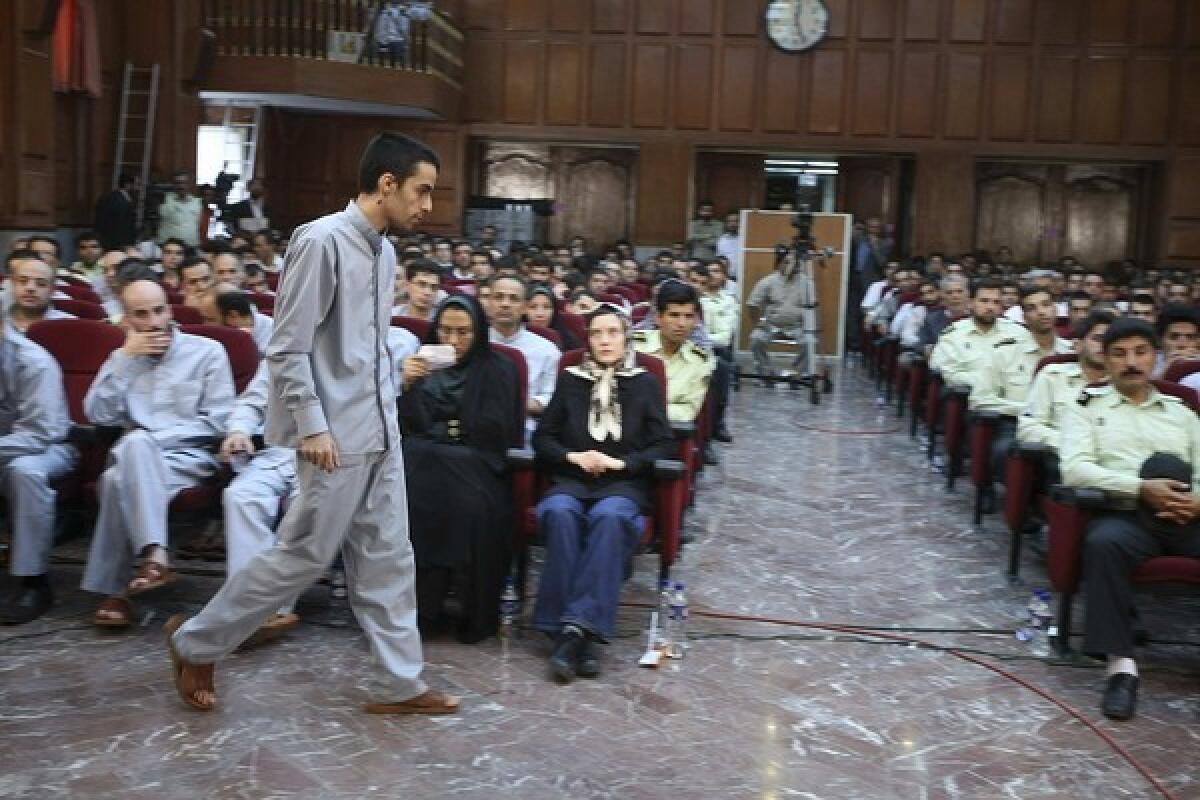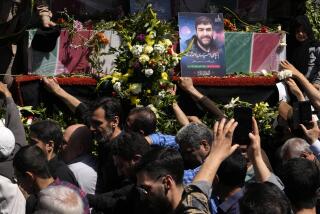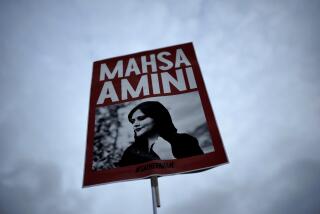Iran executes 2 alleged government opponents

Iran executed two alleged government opponents Thursday, sentenced nine others to death as “enemies of God” and warned of more public trials of opposition supporters in an apparent attempt to intimidate a widespread protest movement challenging the nation’s hard-line establishment.
Mohammad-Reza Ali-Zamani, 37, and Arash Rahmanipour, 20, were hanged before dawn as members of an outlawed monarchist group, the Kingdom Assembly, Iranian news reports said.
The government has stepped up legal pressure on the opposition movement with another round of confrontations possible Feb. 11, the 31st anniversary of the founding of the Islamic Republic. Protesters have vowed to turn the annual march into an antigovernment rally.
Human rights groups have become alarmed by the number of executions in Iran. President Obama, in his State of the Union address Wednesday night, said the United States supports “the human rights of the women marching through the streets of Iran.”
On Thursday, his administration quickly condemned the hangings.
“We see it as a low point in the Islamic Republic’s unjust and ruthless crackdown on peaceful dissent,” White House Deputy Press Secretary Bill Burton said. “Murdering political prisoners who are exercising their universal rights will not bring the respect and legitimacy the Islamic Republic seeks. It will only serve to further isolate Iran’s government in the world and from its people.”
Iran is mired in one of its greatest domestic political crises in decades, triggered by the disputed June reelection of President Mahmoud Ahmadinejad. Authorities blame the unrest on Western nations and Israel working in cahoots with domestic opposition groups seeking to overthrow the government.
Officials have vowed to crack down hard on the protesters.
“The dust has settled and the seditionists have been unmasked,” police chief Gen. Esmail Ahmadi-Moghaddam said Thursday, according to the official Islamic Republic News Agency. “There is no more room for leniency. At stake is safeguarding the regime, and we will show no tolerance.”
There are few signs that the opposition is backing down. Despite a violent crackdown and ongoing threats, the wife of opposition figure Mir-Hossein Mousavi said this week that she and her husband were prepared to die to continue their fight. Reformist politician and former presidential candidate Mehdi Karroubi on Tuesday reiterated his allegation that Ahmadinejad’s reelection was fraudulent.
“The protesters and I continue to question the legitimacy of this way of coming to power and I still believe that the people’s right in determining their fate was trampled upon,” he said, according to his news website Sahamnews.com. “This government will not survive because it is not born out of the people’s vote.”
The connection between Thursday’s executions and Iran’s political turmoil remained unclear. Nasrin Sotoudeh, Rahmanipour’s lawyer, told Iranian news websites that her client was arrested in April. The website of Iran’s state-owned Press TV said Ali-Zamani and Rahmanipour were involved in the deadly April 2008 bombing of a mosque in the southern Iranian city of Shiraz that killed 13 people and injured 200.
Tehran prosecutor Abbas Jafar-Dolatabadi told state television that the two had tried to procure explosives and planned to assassinate officials with the aim of overthrowing the government.
The nine others sentenced to death on charges of being mohareb, or enemies of God, are accused of taking part in recent protests -- including those Dec. 27 during the Shiite Muslim religious holiday Ashura, when demonstrators and security forces clashed in several Iranian cities.
The Iranian Students News Agency reported that the nine are accused of plotting to overthrow the Islamic Republic and of being members of the Kingdom Assembly or the Mujahedin Khalq Organization, an outlawed Iranian militant group listed by the United States as a terrorist group.
Iranian news reports said an appeals court was reviewing the death sentences.
Dolatabadi also said more political prisoners would be put on trial Saturday in “public” forums that could resemble the televised mass hearings last summer that were derided by critics as political show trials.
“God willing, it will become clear to the people and public opinion what big crimes were carried out by various groups, including hypocrites, leftists, Bahais and antirevolution groupings,” Dolatabadi said in an interview with state television. “These grouplets thought that with such measures they could create a rift in people’s resolve.”
Bahais are members of an outlawed religious minority. “Hypocrites” usually refers to the Mujahedin Khalq.
Christi Parsons of the Washington bureau contributed to this report.
More to Read
Start your day right
Sign up for Essential California for news, features and recommendations from the L.A. Times and beyond in your inbox six days a week.
You may occasionally receive promotional content from the Los Angeles Times.






